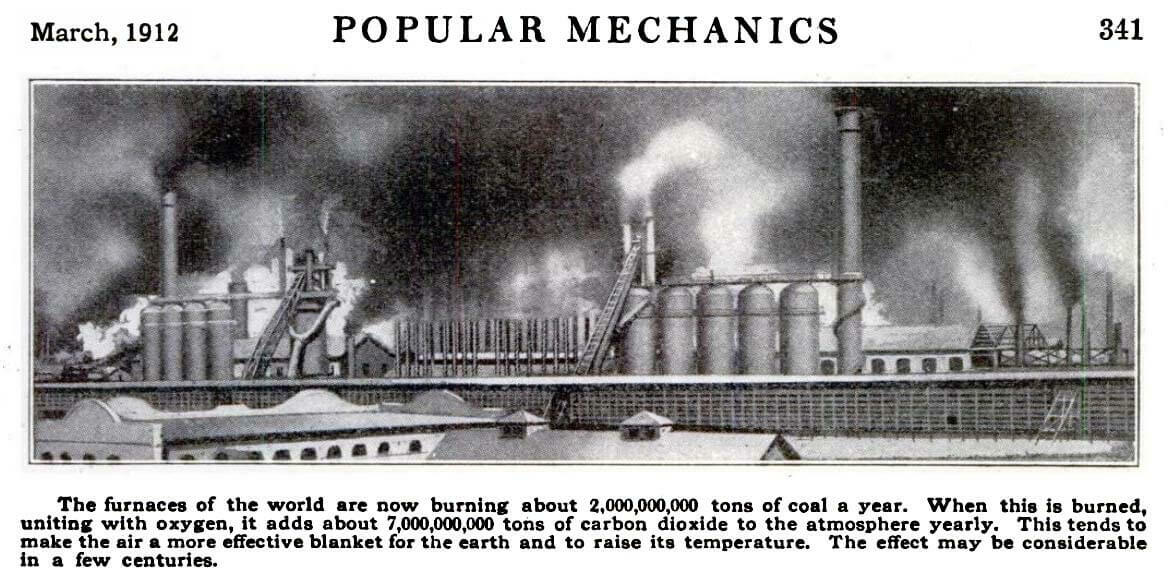Yeah but why did they need to get political about it?/s
$$$
Oh how right/wrong they were… 😮
At that level of co2 production, they were probably right about the timetable. What they couldn’t predict is that co2 production would rise so dramatically with automobiles and industry in the decades after that. They were at 7 billion tons a year then. We are over 36 billion tons a year now, over 5 times as much. That has clearly expedited the effects on the climate.
That’s so cool to know! Oh wait I mean hot, and also not, well anyway thanks for sharing:-P.
What they couldn’t predict is that co2 production would rise so dramatically
interestingly enough in the early 1900 there were more electric cars than ICEs in north america
That was probably fairly accurate at that time.
Look at the historical data here:
https://ourworldindata.org/co2-emissions
BTW, the large recent drop in co2 emissions, covid.
“large”… If only. Barely a drop in the bucket.
I never thought I’d say this, but looks like we need more pandemics!
This is actually a thought that some climate deniers have. “Climate change is a hoax to control you, covid was the trial run”.
Unsurprisingly, the people who say that publicly tend to be funded by oil.
Why doesn’t anyone ever think COVID was sent by God to give us a reprieve and a chance to get our act together, which we’re now squandering?
Good news! We’re continuing to shit on our biodiversity safety net.
Seems like legally requiring hybrid work benefits would get us significantly closer to those goals
Whenever I think about this article, I think about how they could not have possibly known how emissions would grow, and they were perfectly reasonable to frame it this way. And if things stayed at that rate, we would have been able to do something about it so easily when we started getting worried
It’s a good thing someone noticed this back then, and the world dumped the coal industry. Imagine how fucked we’d be now if this was completely ignored.
While kicking The can down the road, you come across a sign.
BRIDGE OUT AHEAD
What do you do?
- Continue kicking the can, I’m sure it’ll be fine.
- I don’t believe in bridges.
- Even if God let the bridge collapse, which he wouldn’t, I’ll go to heaven if I fall and die, so who cares?
- Pick up the can and go find a dumpster.
- There’s squirrels in my pants! Jump to safety!
Yes, all of that. In that order.
Woke. Cancel them. Get politics out of my newspapers.
They have already been canceled.
Because they never account for exponential consumption growth. It was “a few centuries” at current consumption.
Aren’t there still people trying to suggest that we still don’t know if climate change is scientifically understood/proven? This is crazy that we knew about this so long ago!
Not seriously, no. Are there people lying in order to betray their entire species for absolutely no benefit? Yes.
No benefit? No, of course not. But for more money to the shareholders of the oil and coal companies which some politicians either are or get payed by. OF COURSE! They will do it gladly with a smile.
Renewables aren’t funded anything close to what governments of any country spend on oil and coal companies, and that’s for the benefit of the very few people who own them.
Didn’t we already figure out the whole climate change story way back long ago? And the only reason why we didn’t do anything about it were studies funded by the oil industry so that they absolutely have to show there was “no link” between our CO2 emissions and the global temperature? Because I’m pretty sure that’s the story.
Solé’s fantastic and extremely recommendable book “Phase Transitions” covers this as well. Quoting Janssen et al.: “even when the group is faced with negative results, members may not suggest abandoning an earlier course of action, since this might break the existing unanimity.”
“More generally, the underlying problem here is why complex societies might fail to adapt […]. Even if there is some social perception of risk, short-term thinking often prevails when facing long-term vulnerabilities. Such undesirable behavior is often favored by a combination of incomplete understanding of the problem, together with the misleading view that all changes are reversible.”misleading view that all changes are reversible
That is chilling.
Kind of the opposite in this case no?
hehe :)
The thing that really gets me about these ignorant fuckers is it’s not just the indisputable math, it’s that we’ve observed the proof not just in our ecosystem, but on Venus. You can’t even pretend we don’t know how these systems work in at least a general sense.
To be fair, in 1912 it was not at all obvious at which scale humanity started to burn everything after 1950.
Only one century has passed since then, so we’re still good. It’s pollutin’ time!
Idk why but captain planet popped up in my head when I read the last sentence.
And this is when the topic was published by a newspaper.
If memory serves, the fist scientific publications were from the 1880s.That may end up being correct. The models predicting the most catastrophic effects are often showing that for 2100, which would be nearly 200 years from the publish date.
And my friends and family wonder why I’m not having kids. I’m sure eager to bring new life in right before one of the most cataclysmic events of humanity, that’s for sure.
It said a few centuries, not a couple.
what’s the difference?
What’s funny about that newspaper excerpt is that it is word-for-word plagiarized from a picture caption in earlier article in Popular Mechanics, March 1912

The reporter for Rodnen and Otamatea Times must’ve been on tight deadlines!
It’s Rodney, the district just north of Auckland in New Zealand
just could not imagine the scale at which human civilization would escalate. Apart from that, spot on.
That’s like 30 years after the concept was first understood. Even now the concept is downplayed so people don’t reject it outright
And even today, almost no one truly understands the implications of exponential growth… I’d give them full marks













